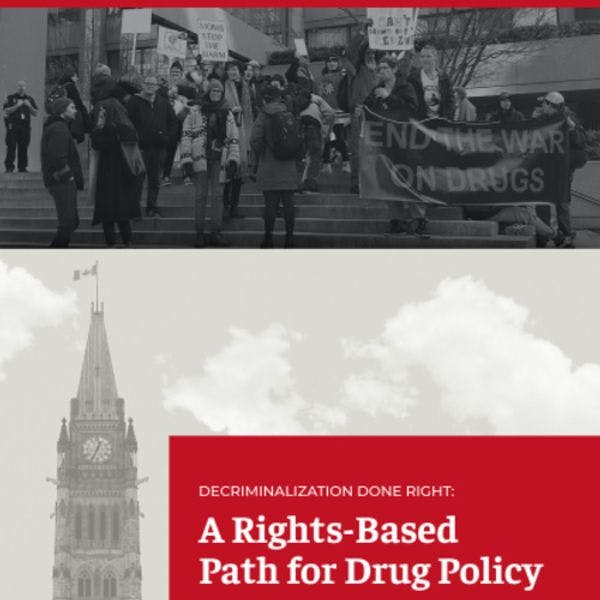Decriminalization done right: A rights-based path for drug policy
Punitive drug laws and policies purported to deter drug use have failed — and worse, they have donecatastrophic harm. They have fueled deadly stigma; epidemics of preventable illness and death; poverty;homelessness; and widespread, systematic, and egregious violations of human rights. They are rooted in,and have reinforced, sexism, racism, and colonialism. They have destroyed lives, torn families apart, andundermined communities’ well-being and safety. They have wasted inordinate sums of public money tocause terrible damage.
Recognizing the many lives that have been lost and ruined to the state-sanctioned “war on drugs,” we mustact to end the harm. We must stop stigmatizing drug use and pointlessly punishing people who use drugs.We must expand harm reduction programs; ensure access to non-coercive, evidence-informed treatmentand supports; scale up safe supply measures; and ensure that policies, programs, and services protect andpromote health and socio-economic wellbeing. At the heart of these reforms must be efforts focused onreducing poverty; ensuring access to housing; and combatting violence, sexism, racism, discrimination, andimplementing the Calls to Action in the Truth and Reconciliation Commission report and the Calls to Justicein the report of the Missing and Murdered Indigenous Women and Girls Inquiry, and other commitments.
Decriminalizing personal drug possession and necessity trafficking are fundamental, necessary stepstowards a more rational and just drug policy, and away from our current anti-drug policies. It is a changethat is long overdue.
We call on the Government of Canada to adopt an anti-racist, anti-colonial, human rights–based approach to drug policy that does not rely on criminal, administrative, and medical interventions that maintain the goal of dissuading drug use, and under which people who use drugs continue to be oppressed, coerced, and silenced. Among other measures, our proposed drug policy includes:
1. Fully decriminalizing all drug possession for personal use, as well as the sharing or selling of drugs for subsistence, to support personal drug use costs, or to provide a safe supply. This requires the removal of criminal sanctions and all other penalties (administrative or otherwise) as follows:
- A full repeal of section 4 of the Controlled Drugs and Substances Act (CDSA) and section 8 of the Cannabis Act;
- Amendments to section 5 of the CDSA, which criminalizes trafficking and possession for the purpose of trafficking, to permit the sharing and selling of drugs for subsistence, to support personal drug use costs, and to provide a safe supply (i.e. “necessity trafficking”);
- Removal of all sanctions and interventions associated with simple drug possession, or with necessity trafficking, including:
▷ administrative penalties, including but not limited to fines, “health assessments,” or dissuasion commissions;
▷ confiscation of substances, paraphernalia, or medical supplies;
▷ geographic, drug use, or personal contact restrictions or curfews;
▷ drug treatment courts as a coercive alternative to criminal sanctions; and
▷ other coerced or involuntary treatment or other health interventions. - Automatic expungement of previous convictions for simple drug possession (including for cannabis) and an applications-based expungement process for necessity trafficking, as well as expungement of previous convictions for breaches of police undertakings, bail, probation, or parole conditions associated with charges for these acts;
- Clear rules and strict limitations relating to when police can stop, search, and investigate a person for drug possession; and
- Removal of police and other law enforcement as “gatekeepers” or “liaisons” between people who use drugs and health and social services, to be replaced by organizations led by people who use(d) drugs or skilled and trained frontline workers.
2. Redistributing resources from the enforcement of these harmful drug laws to non-coercive, voluntary policies, programs, and services that protect and promote people’s health and human rights, including health, education, housing, and social services that support people who use drugs, have been released from prison or are incarcerated due to conviction for drug-related offences, and promote the safety and well-being of communities.
